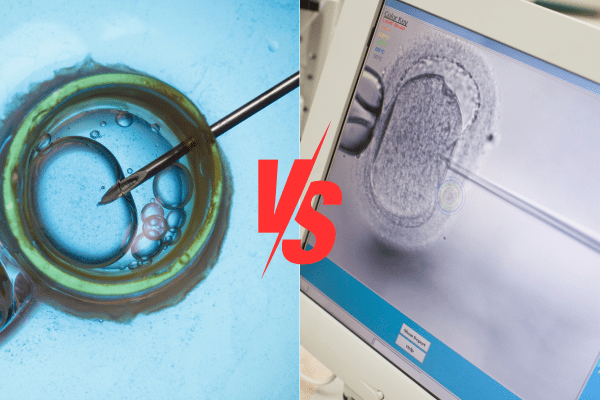In the world of fertility treatments, two commonly used methods are IVF (In Vitro Fertilization) and ICSI (Intracytoplasmic Sperm Injection). These techniques have helped numerous couples overcome infertility and fulfill their dream of having a child. While both IVF and ICSI are effective options, they have distinct differences that make them suitable for different situations. In this article, we will explore the key aspects of IVF and ICSI, their procedures, success rates, and when they are recommended. So, let’s dive in!
Table of Contents
- Introduction to IVF and ICSI
- IVF Procedure
- ICSI Procedure
- Success Rates of IVF and ICSI
- Choosing Between IVF and ICSI
- Risks and Complications
- Emotional and Financial Considerations
- Support and Counseling
- Conclusion
- FAQs
Introduction to IVF and ICSI
IVF and ICSI are advanced reproductive techniques used to assist couples who are struggling with infertility. These methods are usually recommended when other fertility treatments have not been successful. IVF involves fertilizing an egg with sperm in a laboratory dish, while ICSI involves the direct injection of a single sperm into an egg.
IVF Procedure
In the IVF procedure, the woman’s ovaries are stimulated with medications to produce multiple mature eggs. These eggs are then retrieved using a minor surgical procedure. Meanwhile, the partner or donor provides a semen sample, which is processed to obtain the best quality sperm. The retrieved eggs and sperm are then combined in a laboratory dish, where fertilization occurs. The resulting embryos are cultured for a few days before one or more are transferred to the woman’s uterus. Any remaining viable embryos may be cryopreserved for future use.
ICSI Procedure
ICSI is a specialized form of IVF that is suitable for cases of male infertility, where the sperm quality is compromised. In ICSI, a single sperm is selected and injected directly into the center of an egg using a fine needle. The remaining steps of the ICSI procedure are similar to those of traditional IVF.
Success Rates of IVF and ICSI
The success rates of IVF and ICSI vary depending on various factors, including the woman’s age, cause of infertility, and the expertise of the fertility clinic. Generally, IVF has higher success rates compared to ICSI, particularly in cases where male infertility is not a factor. However, for couples facing severe male infertility issues, ICSI offers a higher chance of achieving pregnancy.
Choosing Between IVF and ICSI
The choice between IVF and ICSI depends on individual circumstances and the recommendations of fertility specialists. IVF is generally recommended when there are no significant male infertility concerns, and the cause of infertility lies with the female partner or is unexplained. On the other hand, ICSI is preferred when the male partner has low sperm count, poor sperm motility, or other sperm-related issues.
Risks and Complications
Both IVF and ICSI carry some risks and potential complications. These may include multiple pregnancies, ovarian hyperstimulation syndrome, ectopic pregnancy, and a slightly increased risk of birth defects. However, with advancements in technology and the expertise of fertility clinics, the risks associated with these procedures have been significantly minimized.
Emotional and Financial Considerations
Undergoing fertility treatment can be emotionally and financially challenging for couples. The journey can be filled with a rollercoaster of emotions, from hope and excitement to disappointment and stress. It is crucial for couples to have a strong support system in place and consider seeking counseling to cope with the emotional aspects of fertility treatment. Additionally, the cost of IVF and ICSI should also be taken into account, as these treatments can be expensive.
Support and Counseling
Throughout the IVF or ICSI process, it is essential for couples to have access to support and counseling services. Many fertility clinics offer counseling as part of their comprehensive care. This support can help couples navigate the emotional challenges, make informed decisions, and provide guidance during the treatment journey.
Conclusion
IVF and ICSI are two valuable fertility treatment options that have helped countless couples achieve their dream of having a child. The choice between IVF and ICSI depends on individual circumstances, including the cause of infertility and any male factor issues. It is essential to consult with a fertility specialist who can assess the specific situation and recommend the most suitable treatment approach.
FAQs
- Is IVF or ICSI more expensive?
IVF and ICSI can vary in cost depending on the fertility clinic and additional services required. Generally, ICSI tends to be slightly more expensive than conventional IVF due to the additional laboratory techniques involved.
- Can ICSI be used in cases of female infertility?
Yes, ICSI can be used in cases of female infertility if there are no significant issues with the woman’s eggs or ovaries. It is primarily recommended when the male partner has fertility-related concerns.
- Are there any guarantees of success with IVF or ICSI?
Unfortunately, there are no guarantees of success with either IVF or ICSI. Success rates can vary depending on multiple factors, including age, overall health, and the cause of infertility.
- How long does the IVF or ICSI process take?
The IVF or ICSI process typically takes several weeks, involving various stages, including ovarian stimulation, egg retrieval, fertilization, embryo culture, and embryo transfer.

